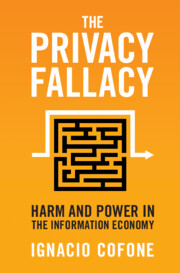Refine search
Actions for selected content:
33 results
Introduction
-
- Book:
- Making and Breaking the Rules in Business and Human Rights
- Published online:
- 13 December 2025
- Print publication:
- 22 January 2026, pp 1-17
-
- Chapter
- Export citation
Conclusion
-
- Book:
- Making and Breaking the Rules in Business and Human Rights
- Published online:
- 13 December 2025
- Print publication:
- 22 January 2026, pp 316-328
-
- Chapter
- Export citation

Corporate Power and the Politics of Change
-
- Published online:
- 17 December 2025
- Print publication:
- 18 December 2025
-
- Textbook
- Export citation
Corporate Power, Conflict and Transitional Justice: Addressing Business Human Rights Abuses in the Digital Era
-
- Journal:
- Business and Human Rights Journal / Volume 10 / Issue 2-3 / October 2025
- Published online by Cambridge University Press:
- 20 November 2025, pp. 318-334
-
- Article
-
- You have access
- Open access
- HTML
- Export citation
Ligue Ivorienne des Droits de L’Homme and Others v. Cote D’Ivoire. App. No. 041/2016
- Part of
-
- Journal:
- American Journal of International Law / Volume 118 / Issue 4 / October 2024
- Published online by Cambridge University Press:
- 15 November 2024, pp. 710-716
- Print publication:
- October 2024
-
- Article
-
- You have access
- Open access
- HTML
- Export citation
The EU Directive on Corporate Sustainability Due Diligence (CSDDD): The Final Political Compromise
-
- Journal:
- Business and Human Rights Journal / Volume 9 / Issue 2 / June 2024
- Published online by Cambridge University Press:
- 29 May 2024, pp. 294-300
-
- Article
-
- You have access
- Open access
- HTML
- Export citation
Business and Human Rights in Central and Eastern Europe: Trends, Challenges and Prospects
-
- Journal:
- Business and Human Rights Journal / Volume 9 / Issue 1 / February 2024
- Published online by Cambridge University Press:
- 12 April 2024, pp. 1-14
-
- Article
-
- You have access
- HTML
- Export citation
8 - Mind the Agency Gap in Corporate Social Responsibility
- from Part II - Transnational Attribution
-
-
- Book:
- States, Firms, and Their Legal Fictions
- Published online:
- 29 February 2024
- Print publication:
- 07 March 2024, pp 151-172
-
- Chapter
- Export citation
7 - Privacy as Corporate Accountability
-
- Book:
- The Privacy Fallacy
- Published online:
- 16 November 2023
- Print publication:
- 30 November 2023, pp 138-164
-
- Chapter
- Export citation
Introduction
-
- Book:
- The Privacy Fallacy
- Published online:
- 16 November 2023
- Print publication:
- 30 November 2023, pp 1-10
-
- Chapter
- Export citation
Conclusion
-
- Book:
- The Privacy Fallacy
- Published online:
- 16 November 2023
- Print publication:
- 30 November 2023, pp 165-172
-
- Chapter
- Export citation

The Privacy Fallacy
- Harm and Power in the Information Economy
-
- Published online:
- 16 November 2023
- Print publication:
- 30 November 2023
Mind the Governance Gaps: Harmful Corporate Strategies Leading to Avoidance of Responsibility and Civil Society Counter-Strategies
-
- Journal:
- Business and Human Rights Journal / Volume 8 / Issue 2 / June 2023
- Published online by Cambridge University Press:
- 17 July 2023, pp. 284-291
-
- Article
- Export citation
Lessons from the ANZ-Phnom Penh Sugar Case for the OECD National Contact Point System of Corporate Accountability
-
- Journal:
- Business and Human Rights Journal / Volume 8 / Issue 3 / October 2023
- Published online by Cambridge University Press:
- 22 June 2023, pp. 448-453
-
- Article
- Export citation
6 - Backlash against Corporate Accountability for Grave Human Rights Violations in Colombia
-
-
- Book:
- The Limits of Judicialization
- Published online:
- 11 August 2022
- Print publication:
- 25 August 2022, pp 139-163
-
- Chapter
- Export citation
15 - Emerging Discussions and Narratives
- from Part V - Selected Industries and Emerging Discussions
-
- Book:
- Business and Human Rights
- Published online:
- 05 March 2022
- Print publication:
- 24 March 2022, pp 348-363
-
- Chapter
- Export citation
Corporate responsibility and biodiversity conservation: challenges and opportunities for companies participating in China’s Belt and Road Initiative
- Part of
-
- Journal:
- Environmental Conservation / Volume 49 / Issue 1 / March 2022
- Published online by Cambridge University Press:
- 13 January 2022, pp. 42-52
-
- Article
-
- You have access
- Open access
- HTML
- Export citation
The Montara Class Action Decision and Implications for Corporate Accountability for Australian Companies
-
- Journal:
- Business and Human Rights Journal / Volume 6 / Issue 3 / October 2021
- Published online by Cambridge University Press:
- 09 September 2021, pp. 599-606
-
- Article
-
- You have access
- Open access
- HTML
- Export citation
The Reformed EU Human Rights Sanctions Regime: A Step Forward or an Empty Threat?
-
- Journal:
- Business and Human Rights Journal / Volume 6 / Issue 3 / October 2021
- Published online by Cambridge University Press:
- 31 August 2021, pp. 559-566
-
- Article
- Export citation
A Neatly Engineered Stalemate: A Review of the Sixth Session of Negotiations on a Treaty on Business and Human Rights
-
- Journal:
- Business and Human Rights Journal / Volume 6 / Issue 2 / June 2021
- Published online by Cambridge University Press:
- 03 June 2021, pp. 384-391
-
- Article
- Export citation
